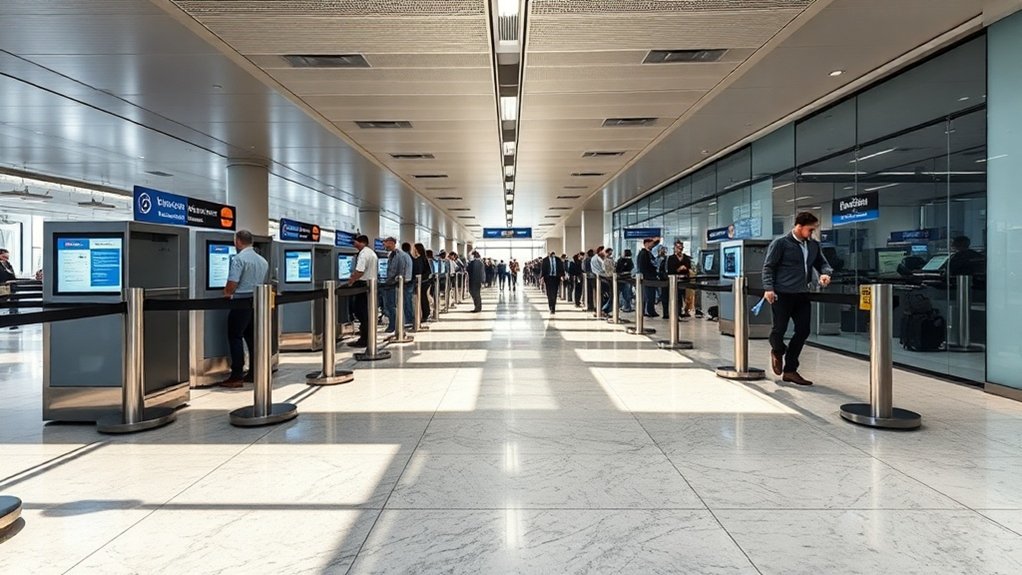When you’re planning to work remotely from Portugal, you’ll face a critical decision that could determine your legal status for the next two years. Choosing between entering as a tourist or applying for digital nomad status isn’t just about paperwork—it’s about accessing healthcare, opening bank accounts, and avoiding potential legal complications that most remote workers don’t see coming until it’s too late.
Understanding Portugal’s 90-Day Tourist Entry Framework

When you arrive in Portugal as a tourist, you’re automatically granted a 90-day stay within any 180-day period under the Schengen Agreement rules. This framework applies to citizens from visa-exempt countries, including the United States, Canada, Australia, and the United Kingdom.
You can’t extend this tourist period or reset it by briefly leaving Portugal and returning immediately. The 180-day calculation runs continuously, meaning you must track your cumulative days across all Schengen countries. If you’ve spent 90 days in Portugal, you can’t legally remain longer without proper authorization.
Tourist status restricts you from engaging in any work activities, including remote work for foreign employers. You’re limited to leisure, business meetings, conferences, or short-term educational activities. Violating these restrictions can result in fines, deportation, or future entry bans.
Understanding these limitations helps you determine whether tourist entry suits your needs or if you should pursue Portugal’s digital nomad visa instead. Given the complexity and frequent updates of immigration laws, specialized legal guidance ensures you navigate these requirements correctly and avoid potential complications with your immigration status.
Digital Nomad Visa Requirements and Qualification Criteria
Portugal’s digital nomad visa offers a legal pathway to work remotely while living in the country for up to one year, with the possibility of renewal. You’ll need to demonstrate monthly income of at least €760 or show €9,120 in your bank account for the visa duration.
You must provide proof of remote work arrangements, whether you’re employed by a foreign company or operating as a freelancer. Your employer can’t be Portuguese-based, and you’ll need employment contracts or client agreements as documentation.
Additional requirements include clean criminal background checks from your home country, valid health insurance covering Portuguese territory, and accommodation proof. You can’t apply from within Portugal – applications must be submitted at Portuguese consulates in your residence country.
The application process typically takes 60 days, and you’ll pay approximately €75 in fees. Unlike tourist stays, this visa allows you to work legally and establish temporary residency. Given the complexity of immigration laws and frequent policy changes, obtaining specialized legal support can help prevent delays and unnecessary expenses throughout the application process.
Legal Residency Rights and Obligations Under Each Status

Your legal status determines how long you’re allowed to stay in a country and whether you can legally earn income during your visit. As a tourist, you’ll typically face strict time limits ranging from 30 to 90 days, and you’re prohibited from working or conducting business activities. Digital nomad visas extend your residency duration significantly—often 6 months to 2 years—while explicitly granting you the right to work remotely for foreign employers or clients. Improper processing of your immigration status can lead to serious consequences including fines, deportation, and barriers to obtaining future legal documents.
Residency Duration Limits
Although both digital nomad and tourist statuses grant you temporary residence rights, the duration limits differ significantly and come with distinct legal obligations. Tourist visas typically allow stays of 90 days within a 180-day period across most EU countries, requiring you to leave and reset your visa clock. You can’t extend this period without risking overstay penalties.
Digital nomad visas offer longer durations, usually ranging from six months to two years, depending on the country. You’ll have clearer renewal pathways and won’t face the same exit requirements. However, you must maintain specific income thresholds and comply with tax obligations in your host country. Portugal’s D7 visa, for instance, allows initial one-year stays with renewal options, while Estonia’s digital nomad visa permits stays up to twelve months.
For those seeking more permanent solutions, employment-based visas like EB-1 and EB-2 categories provide pathways to U.S. permanent residency for qualified professionals with extraordinary abilities or advanced degrees.
Work Authorization Requirements
Beyond residency duration, the most significant difference between these statuses lies in work authorization scope and restrictions. Tourist status strictly prohibits any income-generating activities within Portugal. You can’t legally work for Portuguese companies, provide services to Portuguese clients, or earn revenue from Portuguese sources. Violation results in immediate deportation and future entry bans.
Digital nomad status grants comprehensive work authorization, but with specific parameters. You’re permitted to work remotely for foreign employers, operate international businesses, and serve non-Portuguese clients. However, you can’t accept employment from Portuguese companies or provide services directly to Portuguese residents without proper work permits.
This distinction fundamentally shapes your legal standing and determines whether your activities constitute lawful residence or illegal employment. Understanding proper work authorization requirements is crucial since immigration violations can result in deportation and affect future visa applications, similar to how U.S. immigration authorities strictly enforce employment restrictions for different visa categories.
Tax Implications and Financial Compliance Considerations
When you transition from tourist to digital nomad, tax obligations become significantly more complex and demand careful attention to both your home country’s requirements and those of your host destinations.
You’ll need to determine tax residency status, which varies by jurisdiction and depends on factors like physical presence days, permanent home location, and center of vital interests. Many countries operate on territorial or worldwide taxation systems, affecting how your remote income gets taxed.
Digital nomads must track income sources, client locations, and work performed in different countries. Some nations require tax registration after specific time thresholds, while others offer special tax regimes for remote workers.
You’re also responsible for understanding double taxation treaties between countries to avoid paying taxes twice on the same income. Keep detailed records of travel dates, income earned per location, and expenses. Consider consulting international tax professionals familiar with digital nomad regulations to ensure compliance and optimize your tax strategy across multiple jurisdictions.
In Brazil specifically, obtaining your CPF registration becomes essential for accessing banking services and establishing financial compliance as a digital nomad working within the country.
Healthcare Access and Social Benefits Comparison

Healthcare coverage represents one of the most critical differences between tourist and digital nomad status, as your access to medical services and social benefits varies dramatically based on your classification.
As a tourist, you’ll rely primarily on travel insurance for medical emergencies, with limited access to Portugal’s National Health Service (SNS). You can’t access subsidized healthcare or social benefits during short-term stays.
Digital nomad status, however, opens doors to comprehensive healthcare integration. You’ll gain access to SNS services, including routine medical care, specialist consultations, and emergency treatments at significantly reduced costs. This status also qualifies you for social security benefits, unemployment protection, and family allowances if you meet contribution requirements.
The financial implications are substantial. Tourist medical expenses can reach thousands of euros for serious conditions, while digital nomads pay minimal fees through SNS. Additionally, nomad status provides healthcare continuity, allowing you to establish relationships with local healthcare providers and maintain consistent medical records.
Without proper legal guidance, navigating these status distinctions can lead to missed opportunities for healthcare access and potential complications in your immigration process.
Banking Services and Financial Institution Requirements
Banking relationships in Portugal reflect the same status-based distinctions that shape healthcare access, with financial institutions offering vastly different services and requirements depending on whether you’re classified as a tourist or digital nomad.
As a tourist, you’ll face significant limitations when opening Portuguese bank accounts. Most banks require proof of residence, employment contracts, or substantial deposit minimums that tourists can’t provide. You’ll likely rely on international cards with hefty foreign transaction fees and limited ATM access.
Digital nomad status transforms your banking options entirely. You can establish full Portuguese bank accounts with standard documentation like your visa and temporary residence certificate. This unlocks local payment systems, direct debits for utilities, and preferential exchange rates. You’ll qualify for credit products, investment accounts, and mortgage pre-approvals that remain completely inaccessible to tourists.
For investors considering long-term financial planning, establishing Portuguese banking relationships can support future Golden Visa applications and their associated investment requirements.
The banking advantages alone often justify pursuing digital nomad status over extended tourist stays.
Long-Term Residency Pathways and Renewal Strategies

You’ll need to understand visa extension requirements if you’re planning to stay beyond your initial digital nomad or tourist period. Most countries require you to submit renewal applications well before your current status expires, often 30-60 days in advance. If you’re considering a permanent move, you’ll want to research permanent residence applications early since these processes can take months or even years to complete. Specialized legal assistance ensures a secure and smooth immigration process by helping you navigate complex documentation requirements and avoid costly errors that could lead to visa denials.
Visa Extension Requirements
When your initial visa period approaches expiration, understanding extension requirements becomes crucial for maintaining legal status in your chosen destination. Digital nomad visas typically offer more straightforward renewal processes compared to tourist visa extensions, which often require leaving the country.
| Visa Type | Extension Process | Required Documentation |
|---|---|---|
| Digital Nomad | Online renewal available | Income proof, health insurance |
| Tourist | Border run or embassy visit | Return ticket, accommodation proof |
| Work Permit | Employer sponsorship | Employment contract, tax records |
| Student | Academic institution support | Enrollment verification, financial statements |
You’ll need to submit applications before your current visa expires. Digital nomad extensions often allow consecutive renewals, while tourist extensions may have annual limits. Preparation involves gathering financial documentation, maintaining health insurance coverage, and ensuring your passport validity extends beyond your intended stay period. The complexity of immigration laws means that even minor errors in documentation or timing can result in visa denials, making professional guidance essential for successful renewals.
Permanent Residence Applications
While digital nomad visas provide excellent short-term flexibility, many location-independent professionals eventually seek permanent residence to establish deeper roots and gain long-term security. You’ll discover that transitioning from temporary status requires strategic planning and understanding specific pathways available in your chosen destination.
Most countries offer several routes to permanent residence, each with distinct requirements and timelines. You’ll need to evaluate which option aligns with your circumstances and long-term goals.
Key permanent residence pathways include:
- Investment-based programs requiring significant capital contributions or property purchases
- Employment-sponsored applications through local job offers or entrepreneurial ventures
- Family reunification routes via marriage or registered partnerships with citizens
- Skilled worker categories based on education, experience, and language proficiency
- Extended residence programs for individuals maintaining continuous legal presence
Frequently Asked Questions
Can I Switch From Tourist Status to Digital Nomad Visa While in Portugal?
You can’t switch from tourist status to a digital nomad visa while you’re in Portugal. You’ll need to leave the country and apply for the digital nomad visa from your home country or country of legal residence before returning. The digital nomad visa must be obtained through Portuguese consulates abroad, not through immigration services within Portugal itself.
What Happens if My Digital Nomad Application Gets Rejected During Processing?
If your digital nomad application gets rejected, you’ll need to leave Portugal before your current tourist status expires. You can’t remain in the country while appealing the decision. You’ll receive a rejection letter explaining the reasons, and you can reapply after addressing those issues. Make sure you’ve got backup travel plans ready, as overstaying your tourist visa creates serious legal complications for future applications.
Are There Specific Professions Excluded From Digital Nomad Visa Eligibility?
Yes, certain professions are typically excluded from digital nomad visa eligibility. You can’t qualify if you’re in regulated professions requiring local licensing, such as medicine, law, or finance. Jobs involving physical presence like construction, retail, or hospitality are also excluded. Additionally, positions requiring security clearances or handling sensitive data may be restricted. Each country has specific exclusion lists, so you’ll need to verify your profession’s eligibility with the destination country’s requirements.
Can Family Members Accompany Me on a Digital Nomad Visa?
Yes, you can bring family members on most digital nomad visas. Spouses and dependent children typically qualify for accompanying visas or derivative status. You’ll need to prove your relationship through marriage certificates or birth certificates and demonstrate you can financially support them. Each family member must apply separately and meet health insurance requirements. Processing times and fees usually apply to each applicant individually.
What Penalties Exist for Overstaying the 90-Day Tourist Limit?
You’ll face significant penalties for overstaying the 90-day tourist limit, including fines ranging from €60 to €6,000 depending on the duration of your overstay. You may receive an entry ban preventing return to Portugal and the Schengen Area for up to three years. Immigration authorities can also detain and deport you at your expense. These violations appear on your immigration record, affecting future visa applications throughout Europe.
Conclusion
You’ll find that choosing between tourist status and a digital nomad visa significantly impacts your Portuguese experience. While you can’t work legally as a tourist and you’re limited to 90 days, you’ll gain substantial advantages with digital nomad status – including two-year residency, work authorization, healthcare access, and banking privileges. Don’t risk immigration violations by working on a tourist visa when Portugal’s digital nomad program offers comprehensive legal protection and benefits.



